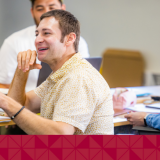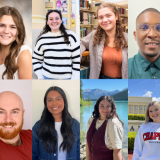Infusing Purpose and Inspiring Action – Isn’t that what education is about?
March 21, 2013
Common Core State Standards in Education
The Common Core State Standards (CCSS) are making their way into education and districts across the nation at different speeds. While some districts are steeped in units of study and/or curriculum mapping, others are choosing to wait and proceed more slowly. With either approach, I believe it is important to use this as an opportunity to infuse purpose in our teaching. The CCSS standards are about how we teach and how students learn. They highlight the need to develop skills of communication, collaboration, and the integration of content in a way that allows students to more critically contextualize their learning.
Recently, I read an article heralding Common Core’s emphasis on cross-content integration. This interdisciplinary approach is often achieved through a thematic approach, which can also include authentic assessment opportunities. While I am excited about this opportunity, I think it is important to avoid promoting learning as a series of activities that loosely connect to essential learning. I fear we will make “real-world” applications that are trivial. For example, graphing M&M candies by color variety sounds like a fun thing to do and can easily relate to our students (Who doesn’t love candy?). But why not take the opportunity to learn about graphing by examining local and global issues that require informed action?
If we consider a recent problem about the manufacturing of candy containing lead, our students could examine this practice and use graphs to illustrate their findings. For example, the incidence of lead poisoning- locally and globally, the number of local stores selling the tainted candy, and further investigations related to other products associated with lead contamination. This in turn would create an opportunity to consider ways in which to address the issue through action.
We must capitalize on the potential this academic shift now affords us and carefully plan learning opportunities that matter- opportunities to clearly demonstrate to our students the value of knowledge. For too long many of our students hungered for purpose. CCSS is not perfect, but it does allow teachers to create learning experiences again. Let’s be sure those experiences really matter.
Connecting standards, inspiring minds
Consider these inspiring integrated education projects that came to fruition:
Connecting service, science education, early learning and the arts was exciting for young students of the new April Woods school, in Haiti. The children collected trash from the hillside where their school sits. Next, they sorted the trash into colors. After it was clean, they used the bits of paper to study geometry and to make colorful mosaics.
North American students in a new education program surprised their cosponsors with the extent to which they were able to evoke change in a short time this summer. Participants in the Habits of Heroes summer program in Marina Park, San Leandro, California, dedicated their summer to the goal of diabetes prevention, applying Vision Seeking, Advocacy and Selflessness. The program reached out to schools where both children and adults were at high-risk for diabetes.
- Students exercised an hour a day, changed their eating habits and integrated science, reading and oral presentations into their service projects.
- The student “heroes” cooked fresh food for their families and helped write letters-to-the-editor advocating a soda tax.
- They learned about community gardening and practiced public demonstrations on the importance of water and comparisons of the PH in water versus sodas and commercial drinks.
- They learned to be advocates from community heroes such as Dr. Preston Maring (who founded farmer’s markets at the region’s Kaiser hospitals) and Jeff Ritterman, a city councilman who initiated a soda tax in his city.
- They even monitored the insulin of a diabetic teacher, to comprehend the influence of exercise and diet on diabetes. By the end of the summer, they had set altruistic career goals related to health.
For more ideas visit www.fullcirclelearning.org
By Marisol Rexach, Ph.D. in Education Student

